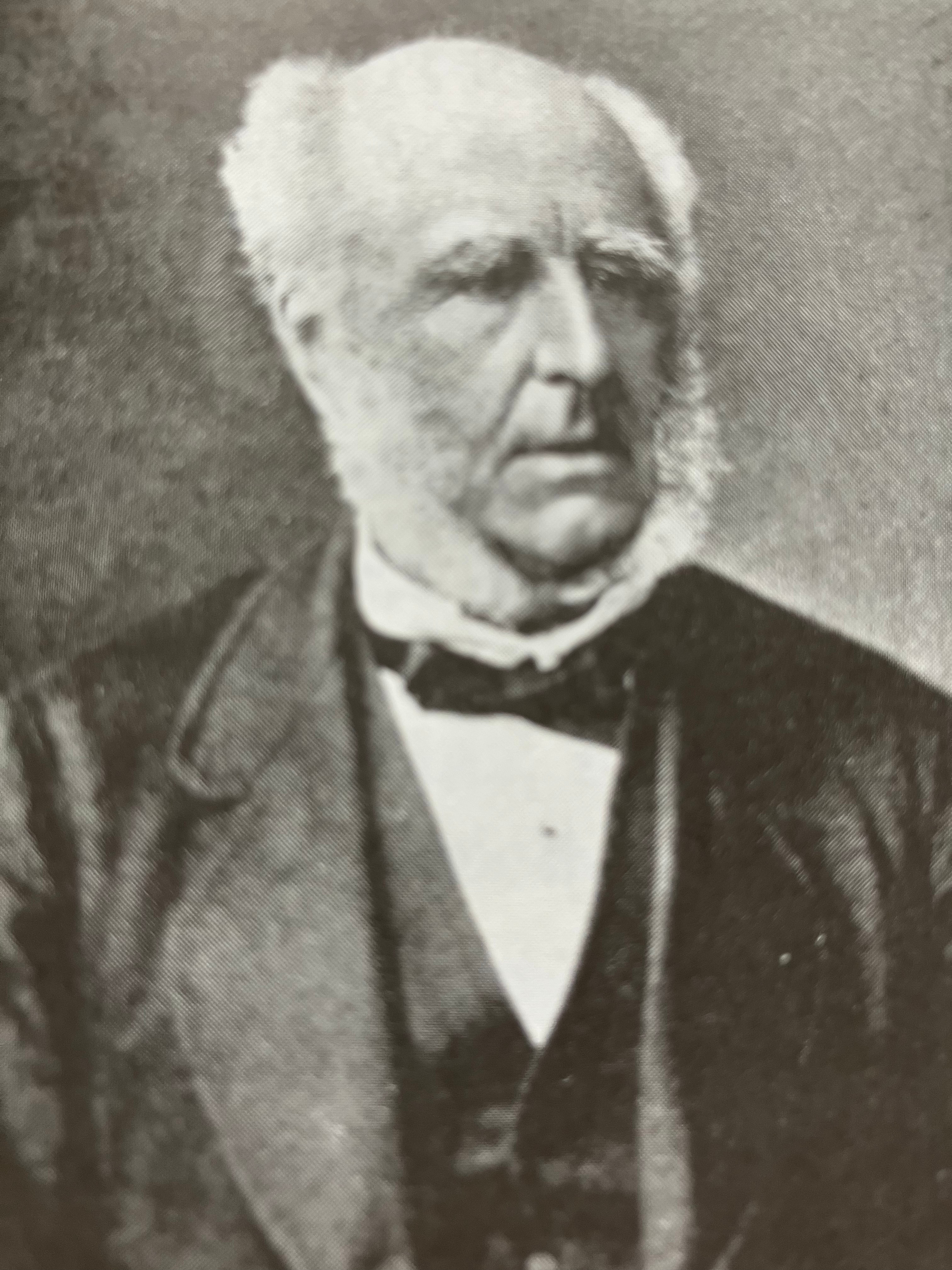Herbert Jenner
From 16th to 18th June 1828, the Marylebone Cricket Club played Kent at Lord’s. Kent won the game by six wickets, and much of the credit for the victory must go to Herbert Jenner, and rather less to John Deedes. Jenner took four of the eight wickets that are credited to bowlers, and scored an unbeaten 33 in Kent’s second innings to guide his team home. He also stumped MCC’s top scorer, George Parry, for 41, which was incidentally Parry’s highest ever first-class score. Deedes scored 5 runs in the first innings, and took one catch. He did not bowl. Thus another link in our chain was established.
Herbert Jenner was a major figure in Kent cricket throughout the nineteenth century. He was born in 1806 and lived to the great age of 98 years and 5 months, dying in 1904, still renowned as a cricketer, even though he had retired from top class cricket in 1836, the year before Queen Victoria came to the throne. He went to school at Eton College, playing for their first XI in 1822 and 1823, and from there went up to Cambridge. He was the last survivor of the very first Oxford v Cambridge match in 1827, captaining Cambridge in that drawn game.
The first time a cricket match between the two universities had been proposed was in 1821, when Cambridge challenged Oxford to a match. Unfortunately, according to the magazine “Bell’s Life”, ‘owing to the unfavourable state of the weather last Monday, the match between Oxford and Cambridge was postponed to a future day’. That future day turned out to be six years later, when Charles Wordsworth of Oxford (and of the poet’s family) proposed the match to Jenner, and it was duly arranged to be played at Lord’s on 4th June. The match was not approved by the Oxford authorities, and Wordsworth could only manage to come to London for the game by telling the dean of his college that he had a dental appointment there. The match, rather unsatisfactorily, ended in a draw after one day, with only one innings completed by each side – Oxford 258 all out, Cambridge 92 all out. Presumably, Wordsworth could not persuade the dean that his dental appointment would last two days. Of Cambridge’s 92, Jenner, batting at number 3, made 47, and bowled almost throughout the Oxford innings, taking 5 wickets. He also kept wicket at the other end when he was not bowling.
Fifty years later, in 1877, at a Jubilee Dinner, an ‘ode’ was sung lustily by the assembled diners. The first verse went: “Fifty years have sped since first/ Keen to win their laurel/ Oxford, round a Wordsworth clustered,/ Cambridge under Jenner mustered/ Met in friendly quarrel.”
Jenner was a very good batsman, perhaps not in the very top class of his era, and also a good bowler, described as a lob bowler, who bowled, according to the cricket historian Arthur Haygarth, ‘semi-underarm’. For most people, though, his strength was his wicket-keeping. He was described as ‘Jenner, of wicket-keepers the King’, and thus clearly takes his place at the start of the long line of great Kent wicket-keepers. He stood back from the stumps rather further than was then the practice, but probably not anywhere near as far back as keepers these days stand back to Jofra Archer, for instance, which meant, Lord Harris noted he ‘was therefore a better hand at fielding ‘draws to the leg’ and ‘tips to the off’. Taking him altogether, his performances have been surpassed by very few gentleman cricketers’. As was normal at that time, he wore no protective equipment such as pads or gloves when keeping wicket, which explains how with little difficulty he could bowl and keep wicket in alternate overs. In the words of a rhyme by Sir Spencer Ponsonby-Fane, one of the founders of I Zingari, “They didn’t mind a few stingers/ And they didn’t wear India-rubber fingers.” Another admirer wrote that, on the other hand, “Wicket-keeper, or bowler, or batter, in all/ He is good, but perhaps he shines most with the ball”.

Poor Herbert Jenner seems to have been fated to be stalked relentlessly by doggerel writers.
Having read law at Cambridge, he became fully qualified as a lawyer in 1835, and the following year gave up serious cricket. He had already been President of MCC in 1833, but from 1836, his legal career took precedence over top class cricket. That is not to say that he lost his interest in the game, nor that he gave up playing. He played for several Kent clubs for many years until 1864, when the terms of an inheritance meant that he added the hyphenated “-Fust” to his surname and moved to Gloucestershire. There, he continued to play for his village, Hill, until well into his seventies. In 1880 he played his final match for the village against local rivals Rockhampton, and as was his usual practice, he bowled from one end and kept wicket from the other (even though by now all keepers except him wore pads and gloves). Apparently ‘in various ways he got ten wickets, besides helping to run two men out’. His one concession to his age was the use of a runner when batting, but sadly this proved his downfall, when after scoring 11, his runner failed to make his ground and Jenner-Fust was run out. The bat he used in this game had been given to him in 1831 by the then secretary of MCC, Benjamin Aislabie. And Hill won the match.
Despite becoming the longest lived first-class cricketer, a record that was not beaten until F.A. MacKinnon, another Kent player, passed his age in 1946, and despite living in Gloucestershire from the year that cricket’s greatest player made his first-class debut, it is said that Herbert Jenner-Fust never ‘took the trouble to see W.G. Grace play’.
0 Comments